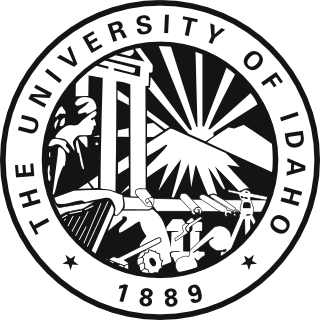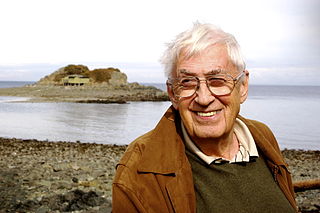Harold Franklin Heady (29 March 1916, Buhl, Idaho – 28 April 2011, La Grande, Oregon) [1] was an American forester, botanist, prairie ecologist, and expert on range management. [2]

Buhl is a city located on the old Oregon Trail in the western half of Twin Falls County, Idaho, United States. The population was 4,122 at the 2010 census, up from 3,985 in 2000. It is part of the Twin Falls Micropolitan Statistical Area.

La Grande is a city in Union County, Oregon, United States. Originally named "Brownsville," it was forced to change its name because that name was being used for a city in Linn County. Its name comes from an early French settler, Charles Dause, who often used the phrase "La Grande" to describe the area's beauty. The population was 13,082 at the 2010 census. It is the county seat of Union County. La Grande lies east of the Blue Mountains and southeast of Pendleton.

Forestry is the science and craft of creating, managing, using, conserving, and repairing forests, woodlands, and associated resources for human and environmental benefits. Forestry is practiced in plantations and natural stands. The science of forestry has elements that belong to the biological, physical, social, political and managerial sciences.
Heady received in 1938 a B.S. from the University of Idaho and in 1940 an M.S. from the New York State College of Forestry in Syracuse. In 1942 he accepted a job teaching range management at Montana State University. Heady earned in 1949 a Ph.D. in plant ecology at the University of Nebraska under the prairie ecologist John Ernest Weaver and was, while working on his doctoral dissertation, on the faculty of Montana State University and then Texas A&M University.

The University of Idaho is the U.S. state of Idaho's flagship public university and is based in Moscow. It is the state's land-grant and primary research university. The University of Idaho was the state's sole university for 71 years, until 1963, and its College of Law, established in 1909, was first accredited by the American Bar Association in 1925.

The State University of New York College of Environmental Science and Forestry is an American, specialized, doctoral-granting institution based in Syracuse, New York. It is immediately adjacent to Syracuse University, within which it was founded, and with whom it maintains a special relationship. ESF is a part of the State University of New York (SUNY) system. ESF also operates facilities in the Adirondack Park, the Thousand Islands, elsewhere in central New York, and Costa Rica. The College's curricula focus on the understanding, management and sustainability of the environment and natural resources. ESF is considered by Peterson's to be the premier college in the U.S. for the study of environmental and natural sciences, design, engineering, policy and management of natural resources and the environment. The college has expanded its initial emphasis on forestry to include professional education in environmental science, landscape architecture, environmental studies, and engineering in addition to distinguished programs in the biological and physical sciences. ESF is ranked at 43rd in the 2017 US News & World Report rankings of the top public national universities. It commemorated its centennial in 2011.

Montana State University (MSU) is a public land-grant university in Bozeman, Montana. It is the state's largest university and flagship campus of the Montana State University System, which is part of the Montana University System. MSU offers baccalaureate degrees in 51 fields, master's degrees in 41 fields, and doctoral degrees in 18 fields through its nine colleges. The university regularly reports annual research expenditures in excess of $100 million, including a record $130.8 million in 2017.
Heady was one of the founders of the Society for Range Management (SRM) and at the SRM's January 1948 meeting became its first secretary–treasurer and in 1980 its president for a one-year term. He resigned from Texas A&M and became in 1951 an assistant professor in the School of Forestry of U. C. Berkeley, where Harold H. Biswell (1905–1992) and Arnold M. Schultz (1920–2013), two of John Weaver's former doctoral students, were also on the faculty. Heady helped to develop range management programs at both the Davis campus and the Berkeley campus of the University of California.
In 1965 the Interdepartmental Graduate Group in Range Management at Berkeley was established; Heady was the first chair of this group, and remained in that role until 1975. He authored or co-authored more than 150 journal articles, dealing with the ecology and management of California grasslands and various related subjects. He spent sabbaticals (supported by a Guggenheim Fellowship for 1958/59 and 2 Fulbright Fellowships) in Kenya, Saudi Arabia, and Australia. He retired from U.C. Berkeley in 1983 as professor emeritus.
His first wife Eleanor Heady née Butler died in 1979 and his second wife Ruth Heady née Atkinson died in 2001. Upon his death, he was survived by a daughter and a son, 3 grandchildren, and 4 great-grandchildren.







